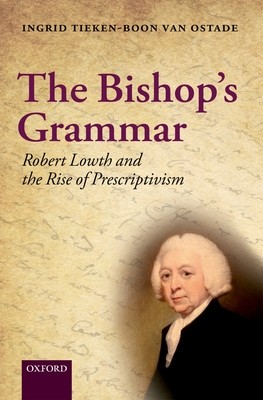
- We will send in 10–14 business days.
- Author: Ingrid Tieken-Boon van Ostade
- Publisher: Oxford University Press, USA
- ISBN-10: 019957927X
- ISBN-13: 9780199579273
- Format: 15.6 x 23.4 x 2.1 cm, hardcover
- Language: English
- SAVE -10% with code: EXTRA
Reviews
Description
This spirited account of the life and times of one of the seminal figures in history of English grammar dispels the myth of Lowth as the icon of prescriptivism, and establishes him as the most important figure in eighteenth-century English grammar.
Ingrid Tiecken-Boon van Ostade reexamines the life and work of Robert Lowth (1710-1787), founder of the grammatical prescriptivism so deprecated by modern linguists and educational theorists. She considers Lowth and his grammar in the context of his times and from the perspective of his aims and readership. She shows that, once the grammar had been accepted for publication, it developed into a publishers' project similar to Samuel Johnson's Dictionary of the English Language to which it was intended as a complement. Professor Tiecken draws on contemporary sources, including Lowth's extensive correspondence and unpublished memoir, to explore the social networks, aspirations, beliefs, and reading habits that informed and shaped his grammar and ideas on language. (She notes that Lowth's own language often falls short of the norms and strictures advanced in his book.) By comparing the grammar - in particular the problems of usage dealt with in its sections on syntax - with guides from thenineteenth and twentieth centuries, she redefines Lowth's seminal position in the history of handbooks for correct usage, as well as his role in the establishment of the canon of prescriptivism. This book will appeal to all those interested in the history of English, the role of language in the Enlightenment, and the long-running debate on linguistic correctness and the merits or otherwise of prescriptive rules in the teaching and use of English.
EXTRA 10 % discount with code: EXTRA
The promotion ends in 18d.05:47:04
The discount code is valid when purchasing from 10 €. Discounts do not stack.
- Author: Ingrid Tieken-Boon van Ostade
- Publisher: Oxford University Press, USA
- ISBN-10: 019957927X
- ISBN-13: 9780199579273
- Format: 15.6 x 23.4 x 2.1 cm, hardcover
- Language: English English
This spirited account of the life and times of one of the seminal figures in history of English grammar dispels the myth of Lowth as the icon of prescriptivism, and establishes him as the most important figure in eighteenth-century English grammar.
Ingrid Tiecken-Boon van Ostade reexamines the life and work of Robert Lowth (1710-1787), founder of the grammatical prescriptivism so deprecated by modern linguists and educational theorists. She considers Lowth and his grammar in the context of his times and from the perspective of his aims and readership. She shows that, once the grammar had been accepted for publication, it developed into a publishers' project similar to Samuel Johnson's Dictionary of the English Language to which it was intended as a complement. Professor Tiecken draws on contemporary sources, including Lowth's extensive correspondence and unpublished memoir, to explore the social networks, aspirations, beliefs, and reading habits that informed and shaped his grammar and ideas on language. (She notes that Lowth's own language often falls short of the norms and strictures advanced in his book.) By comparing the grammar - in particular the problems of usage dealt with in its sections on syntax - with guides from thenineteenth and twentieth centuries, she redefines Lowth's seminal position in the history of handbooks for correct usage, as well as his role in the establishment of the canon of prescriptivism. This book will appeal to all those interested in the history of English, the role of language in the Enlightenment, and the long-running debate on linguistic correctness and the merits or otherwise of prescriptive rules in the teaching and use of English.


Reviews